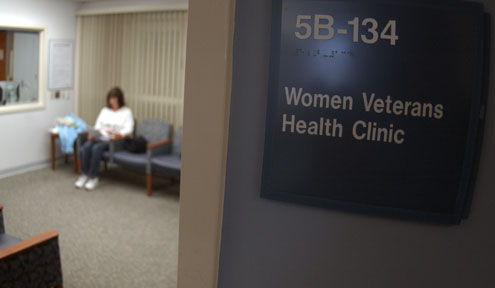VA must focus on homeless women vets, watchdog says
Department should improve transitional housing and coordinate with HUD to gather better data on female vets’ needs, GAO finds.

Ron Agnir/AP
Federal agencies must step up their efforts to curb homelessness for female veterans, the Government Accountability Office said in a new report.
GAO found a dramatic rise in homelessness among women veterans. The number of homeless female vets more than doubled between fiscal 2006 and fiscal 2010, increasing from 1,380 to more than 3,000, the watchdog reported. Numbering 1.8 million, women currently account for 8 percent of all veterans.
The Housing and Urban Development and the Veterans Affairs departments run a joint supportive housing program, and VA has a Homeless Providers Grant and Per Diem program. Veterans Affairs also has several initiatives to end homelessness among veterans by 2015, including a pilot program by the President's Council on Veterans Employment to provide jobs to formerly homeless veterans.
But neither VA nor HUD collects specific data on homeless women veterans, GAO said.
Women veterans also have special needs, the report noted. Often they are single mothers, and might have a psychological condition resulting from sexual trauma experienced during their military service.
One fourth of VA grant and per diem providers GAO surveyed reported they could not immediately provide women's beds and the median wait time is 30 days. Many shelters also lack the ability to house children or do not allow children over a certain age.
In addition, homeless women veterans surveyed cited safety concerns about grant and per diem housing. During the past five years, nine of 142 GPD housing providers had reported incidents of sexual harassment and sexual assault on women residents.
"[Women veterans] have often used all of their available resources from family, friends and community before they come to us, causing them to need immediate help, which is often hard to find," one VA Medical Center homeless coordinator told GAO.
To combat the problem, Veterans Affairs and HUD must coordinate their efforts in collecting the appropriate data on homeless women veterans, including those with children and those with disabilities, the report recommended.
Additionally, VA must find ways to improve transitional housing for homeless women veterans with children and determine safety and security standards for programs and shelters that serve both male and female veterans.
Both departments generally agreed with recommendations. HUD is considering requiring specific gender data to be included in the 2013 count of homeless veterans, but VA has stated that it already gathers enough information on homeless women veterans. GAO officials disagreed, however, and felt VA's current level of information was not detailed enough to help meet the specific needs of homeless women veterans. VA also has stated its plans to work with the Interagency Council on Homelessness and will possibly develop a legislative proposal to identity more transitional housing opportunities.







